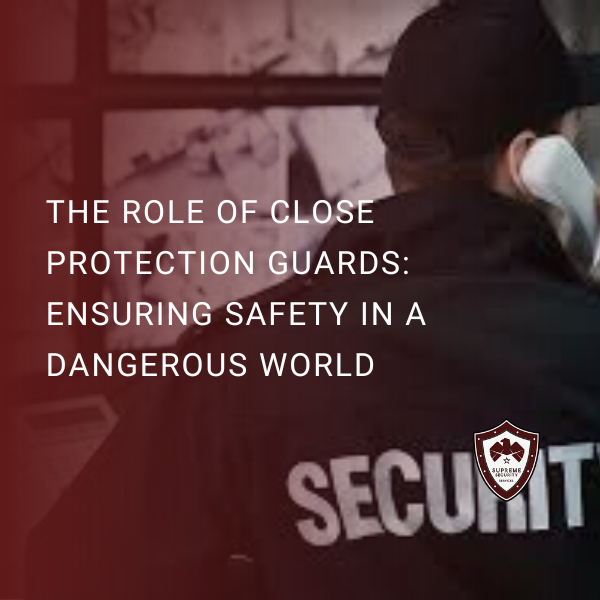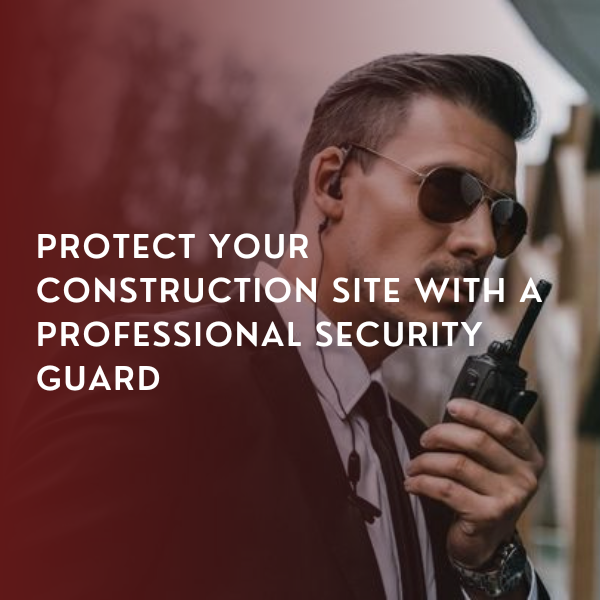Supreme Security Services stand strong as your shield in a world where safety matters most. They’re all about making sure you stay safe, no matter what. This blog is about understanding the real deal behind close protection, and Supreme Security Services are the real experts in this field.
We’ll break down what close protection means, who needs it, and how it works, all with Supreme Security Services leading the way. They’ve got your back, and we’ll show you how they do it. So, let’s dive into the world of close protection and see how these pros make the world a safer place.
Understanding Lose Protection: More Than Just Bodyguards
Close protection, sometimes called executive protection, is a specialized security service to ensure the safety and well-being of individuals facing potential risks. While it may involve physical protection elements, it’s essential to understand that close protection guards do much more than serve as bodyguards. They are highly trained professionals dedicated to holistically safeguarding their clients.
Types of Clients: Diverse Needs, One Goal
Close protection services cater to diverse clients, including celebrities, high-net-worth individuals, corporate executives, and diplomats. Each client has unique security needs, and immediate protection guards are trained to adapt their approach accordingly.
Whether it’s protecting a high-profile celebrity from overzealous fans or ensuring the safety of a corporate executive during a business trip, the goal remains the same: keeping the client safe.
- Threat Assessment: Identifying and Mitigating Risks
One of the foundational aspects of close protection is conducting thorough threat assessments. Close protection guards carefully analyze potential risks and vulnerabilities their clients might face. This proactive approach allows them to anticipate and mitigate threats before they materialize, ensuring the client’s safety.
- Tailored Security Plans: Customized Safety Solutions
Close protection is not a one-size-fits-all service. Instead, it involves creating tailored security plans that address each client’s specific needs and potential threats. These plans consider the client’s daily routine, travel arrangements, and personal preferences.
- Physical Fitness and Training: Ready for Any Situation
Close protection guards undergo rigorous physical and mental training to prepare for any situation. Their fitness and training enable them to respond swiftly and effectively to emergencies. This level of preparedness ensures they can handle various scenarios, from physical confrontations to medical incidents.
- Situational Awareness: The Key to Anticipating Threats
Maintaining a high level of situational awareness is paramount for close protection guards. They are trained to constantly assess their surroundings, identify potential risks, and take preventive actions. This heightened awareness helps ensure that their clients remain safe at all times.
- Effective Communication: Building Trust and Coordination
Communication skills are a cornerstone of close protection. Guards must effectively interact with their clients and coordinate with other security professionals seamlessly. Building trust and maintaining clear lines of communication are crucial elements of their role.
- Emergency Response: Rapid Action in Critical Moments
In emergencies, close protection guards are trained to respond rapidly and decisively. Whether it’s a threat, medical incident, or accident, they are prepared to handle these situations professionally and efficiently.
- Use of Technology: Enhancing Effectiveness
Modern technology plays a significant role in the work of close protection teams. Surveillance equipment, communication devices, and other technological tools enhance their effectiveness, allowing them to stay connected and respond swiftly to emerging threats.
- Confidentiality and Discretion: Upholding Trust
Close protection guards understand the importance of client confidentiality and discretion. They operate discreetly and maintain confidentiality to protect their client’s privacy and safety.
- Legal Considerations: Adhering to the Law
Close protection is subject to legal regulations, including licensing requirements and compliance with local laws. Guards must operate within the boundaries of the law while fulfilling their duty to protect their clients.
- Global Operations: Protecting Clients Worldwide
Close protection guards may be called for international assignments, safeguarding clients during travel and high-risk situations abroad. Their expertise extends beyond borders, ensuring clients remain secure in various global locations.
Case Studies: Real-World Examples: While respecting client privacy and confidentiality, here are a couple of hypothetical case studies to illustrate the real-world impact of close protection:
Case Study 1: Celebrity Safety
A famous pop star was on a world tour, and her concerts attracted massive crowds. Close protection guards worked tirelessly to manage the crowds, ensuring the safety of both the celebrity and her adoring fans.
Case Study 2: Corporate Executive Security
A high-profile corporate executive had an important overseas business trip. Close protection guards accompanied him, handling all security aspects, from securing transportation to conducting thorough threat assessments of each destination.
- Challenges and Rewards: The Close Protection Journey
The role of close protection guards comes with its fair share of challenges, including long hours, high-stress situations, and the need to remain constantly vigilant. However, the rewards are equally significant. Close protection guards take pride in their ability to keep their clients safe, and the trust they build is immeasurable.
FAQs For Close Protection Guards
What’s the difference between close protection and regular security?
Close protection goes beyond typical security services. It involves personalized security plans, in-depth threat assessments, and highly trained professionals prepared for various situations. Regular security services are often more general and may not be tailored to an individual’s needs.
Are close protection guards armed?
While some close protection guards may be armed, it depends on the client’s needs and the legal regulations of the region. Armed guards typically receive extensive training in firearm handling and use.
How do close protection guards handle medical emergencies?
Close protection guards often undergo medical training, including first aid and emergency response procedures. In a medical emergency, they can provide initial care and coordinate with medical professionals for further assistance.
Wrap Up!
Close protection guards play a pivotal role in safeguarding individuals amid evolving threats. Their unwavering commitment, rigorous training, and adaptability allow them to deliver customized security solutions, transcending Hollywood clichés.
In this mission, Supreme Security Services stands as an exemplary leader, offering unmatched expertise and a steadfast dedication to ensuring the safety and well-being of its clients. Together, they make a profound impact, redefining security in our ever-changing world.
Supreme Security Services provides all types of security guard services in Ontario. Please contact Supreme Security Services at 6479669790 or email us your information at info@supremesecurityservices.ca and get a free quote today.


